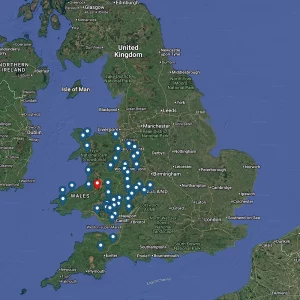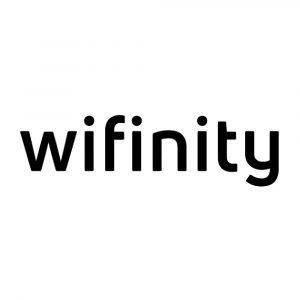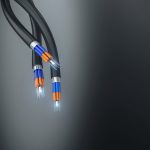Sponsored Links
UPDATE Average UK Broadband Speed Hits 5.2Mb and Ofcom Toughens ISP Rules
Posted: 27th Jul, 2010 By: MarkJ
 The results from Ofcoms latest research into UK fixed-line broadband ISP speeds has today been published. The study, conducted in partnership with Samknows (a broadband monitoring specialist), reveals that the average internet download speed in May 2010 was 5.2Mbps (Megabits per second), which is up from 4.1Mb in April 2009. In response the regulator has also moved to toughen its Voluntary Code of Practice on Broadband Speeds ("the Code").
The results from Ofcoms latest research into UK fixed-line broadband ISP speeds has today been published. The study, conducted in partnership with Samknows (a broadband monitoring specialist), reveals that the average internet download speed in May 2010 was 5.2Mbps (Megabits per second), which is up from 4.1Mb in April 2009. In response the regulator has also moved to toughen its Voluntary Code of Practice on Broadband Speeds ("the Code").However, despite the improved result, nearly a quarter (24%) of fixed line residential broadband connections had an advertised (headline) service speed of more than 10Mbps in May 2010 (8% in April 2009). This essentially represents a widening gap between what consumers are advertised and what is then delivered. We can show this better by using a chart to contrast what is advertised with the real average speed.

The "All connections including 'up to' 2Mbps or less" comparison is a bit too loopy for our liking, but the other two results make more sense. It's clear that the bulk of the difference is coming from newer services that advertise speeds of 16-24Mbps. Faster ISP packages like that are predominantly delivered by 'up to' 24Mbps capable ADSL2+ technology.
However the problem with ADSL2+ is that it only really improves the connection speed by a significant margin (above that of older 8Mbps ADSL technology) when you live very close to the telephone exchange and on a good line. Those on slower/longer lines will often only see a small improvement, if any.
Headline/Advertised speed - (Average actual speed)It's interesting to note that Virgin Media UK's 10Mb and 20Mb Cable Modem services delivered average download speeds around twice as fast as DSL packages with the same or similar headline speed. This is to be expected because a true cable (coax and fibre optic) platform will always be better for faster speeds than dated copper wire technology.
‘Up to’ 8/10Mbit/s DSL packages* (3.3Mbit/s)
‘Up to’ 20/24Mbit/s DSL packages (6.5Mbit/s)
‘Up to’ 10Mbit/s cable services (8.7Mbit/s)
‘Up to’ 20Mbit/s cable services (15.7Mbit/s)
Virgin Media's Executive Director of Broadband, Jon James, commented:
"While Ofcom's report is good news for our customers, it is clear that our DSL [ADSL etc.] competitors just aren’t keeping up with their promises of 20Mb broadband. No DSL customer receives 18Mb, only 2% are receiving more than 14Mb and, on average, DSL providers are delivering just 33% of their advertised 'up to 20Mb' speed. We need to ensure people are not being ripped off and the lack of transparency in broadband advertising risks damaging consumer confidence in superfast broadband."
"While Ofcom's report is good news for our customers, it is clear that our DSL [ADSL etc.] competitors just aren’t keeping up with their promises of 20Mb broadband. No DSL customer receives 18Mb, only 2% are receiving more than 14Mb and, on average, DSL providers are delivering just 33% of their advertised 'up to 20Mb' speed. We need to ensure people are not being ripped off and the lack of transparency in broadband advertising risks damaging consumer confidence in superfast broadband."
Clearly there is a problem and Ofcom has today moved to tackle it by releasing a tougher Voluntary Code of Practice on Broadband Speeds Version 2 (“the Code”), which was first introduced in 2008 (Ofcom's v2 Code). However the code remains difficult for ordinary consumers to read and the regulator hasn't made clear exactly what has changed.
Typically ISPs who have signed up to the revised Code commit to give consumers a more accurate and consistent estimate of the maximum speed likely to be achievable on their line. In addition they must also now publish clearer and more detailed information on any Fair Usage Policies (FUP) or Traffic Management measures and how they work.
ISPs also commit to help consumers improve their speeds and now offer the option to leave their contracts early without penalty (within three months of signing up to the service) if they receive a maximum line speed that is significantly below the estimate they are given at point of sale, and the ISP is unable to resolve the problem. One problem here is that the code does not apply to wholesale providers, which could cause a serious contract conflict between wholesale supply and retail packages.
Ed Richards, Ofcom's Chief Executive, said:
"Ofcom’s research shows that average speeds have increased which is good news, but there is scope for a further step change in the quality of the UK communications infrastructure.
Actual speeds are often much lower than many of the advertised speeds which makes it essential that consumers are given information which is as accurate as possible at the point of sale; this is what the new Code is designed to deliver.
We are delighted that all major ISPs have signed up which is a major step forward."
"Ofcom’s research shows that average speeds have increased which is good news, but there is scope for a further step change in the quality of the UK communications infrastructure.
Actual speeds are often much lower than many of the advertised speeds which makes it essential that consumers are given information which is as accurate as possible at the point of sale; this is what the new Code is designed to deliver.
We are delighted that all major ISPs have signed up which is a major step forward."
It's understood that ISPs will also have to make customers aware of the code within their sales process and provide a full copy of it through an easily accessible link on their respective website(s). Ofcom has allowed 12 months for its updated code to be implemented, although this is only a guidance rule for ISPs who are already signatories to Version 1.0 of the Code.
Peter Vicary-Smith, Chief Executive of Which?, said:
"It's great that Ofcom has taken action to improve the information provided by ISPs at the point of sale, and that customers are now able to end their contract without penalty if the service they receive is significantly different to that promised.
"However, some internet service providers continue to advertise ever-increasing speeds that bear little resemblance to what most people can achieve in reality. We want the Advertising Standards Authority (ASA) to step up to the mark and put an end to these misleading claims once and for all."
"It's great that Ofcom has taken action to improve the information provided by ISPs at the point of sale, and that customers are now able to end their contract without penalty if the service they receive is significantly different to that promised.
"However, some internet service providers continue to advertise ever-increasing speeds that bear little resemblance to what most people can achieve in reality. We want the Advertising Standards Authority (ASA) to step up to the mark and put an end to these misleading claims once and for all."
Robert Hammond, Head of Post and Digital Communications at Consumer Focus, said:
"If consumers pay for a Ferrari-style internet service, they should not get push bike speeds. Broadband users should get what they pay for. The Advertising Standards Authority should take a tough approach to broadband providers who promise speeds they don’t deliver.
It is good that broadband providers are committing to give consumers better information about their likely internet speed and allow them to cancel if they are not getting what they signed up for. However, Ofcom should monitor closely the effectiveness of these new voluntary rules."
"If consumers pay for a Ferrari-style internet service, they should not get push bike speeds. Broadband users should get what they pay for. The Advertising Standards Authority should take a tough approach to broadband providers who promise speeds they don’t deliver.
It is good that broadband providers are committing to give consumers better information about their likely internet speed and allow them to cancel if they are not getting what they signed up for. However, Ofcom should monitor closely the effectiveness of these new voluntary rules."
The research is continuing, and Ofcom is planning to publish a report every six months, with the next report scheduled for January 2011. It is also worth remembering that the UK Advertising Standards Authority (ASA) recently started its own review of how broadband ISPs advertise speeds and "unlimited" downloads (original news). This will be conducted alongside the British Code of Advertising Practice (BCAP) and Committee of Advertising Practice (CAP).
However not everybody is happy with the new code and some smaller ISPs have decided not to sign-up. AAISP in particular has even launched its own alternative code (details here). A list of ISPs that HAVE signed up to the new v2 code can be found HERE. It's still early days but this list is considerably smaller than the v1 Code List of supporting ISPs.
AAISP Statement
The main issue is that performance of broadband lines (in terms of speed) is to be measured by reference to the speeds of similar lines with the same ISP - thus making 1 in 10 customers below some new guaranteed minimum access speed. This is regardless of how good the ISP is, how fast their lines are or how consistent they are for specific line characteristics. We also feel the new code actively discourages pro-active monitoring of broadband line quality and speed (which we do a lot of).
The main issue is that performance of broadband lines (in terms of speed) is to be measured by reference to the speeds of similar lines with the same ISP - thus making 1 in 10 customers below some new guaranteed minimum access speed. This is regardless of how good the ISP is, how fast their lines are or how consistent they are for specific line characteristics. We also feel the new code actively discourages pro-active monitoring of broadband line quality and speed (which we do a lot of).
It will take time for the new changes to have any impact and clearly some providers are likely to shun them, which could make Ofcom more likely to impose a mandatory code upon ISPs at a later date. At present though there is no sign of that happening.
As a side note the newest generation of "super-fast" fibre optic broadband services are also less susceptible to line problems, though ISPs will still need to be careful about what they advertise because promising 40-100Mbps connections to every customer would be difficult to sustain.
Ofcom's May 2010 Broadband Speed Study (PDF)UPDATE 27th July 2010
http://stakeholders.ofcom.org.uk/binaries/research/telecoms-research/bbspeeds2010/bbspeeds2010.pdf
We requested clarification from Ofcom on a few points and managed to get a reply. The new Code is likely to come into force for most ISPs in around 6 to 12 months time (which accounts for systems changes and staff training). Ofcom DOES intend to issue a more consumer friendly version and consumer guide later on in the year/early next year.
Ofcom have also furnished us with some bullet points from the codes key changes between v1 and v2.
- Greater consistency and accuracy of information on speeds achievable by consumers: instead of getting a maximum line speed estimate in the form of a single point estimate, consumers will be given a range which is more likely to be accurate than the single point estimate.
- Giving customers the option to be released from their contracts: consumers will have a new right to be able to leave their contracts without penalty if they receive an maximum line speed which is significantly below the bottom of the estimated range and ISPs are not able to resolve the problem (e.g. by sending an iPlate).
- Ensuring consumers are given their estimated maximum line speed early in the sales process, well before being asked for a firm commitment to sign-up.
- Ensuring consumers are given clear written information that actual speeds may be below both advertised headline speeds and maximum line speeds, as well as information about the other factors affecting actual speeds, including the ISP's fair usage and traffic management policies.
Search ISP News
Search ISP Listings
Search ISP Reviews
Latest UK ISP News








Cheap BIG ISPs for 100Mbps+
150,000+ Customers | View More ISPs
Cheapest ISPs for 100Mbps+
Modest Availability | View More ISPs
Latest UK ISP News
Helpful ISP Guides and Tips
Sponsored Links
The Top 15 Category Tags
- FTTP (6815)
- BT (3886)
- Politics (3082)
- Business (2773)
- Openreach (2666)
- Building Digital UK (2517)
- Mobile Broadband (2480)
- FTTC (2142)
- Statistics (2135)
- 4G (2098)
- Virgin Media (2030)
- Ofcom Regulation (1782)
- 5G (1738)
- Fibre Optic (1605)
- Wireless Internet (1596)
Sponsored
Copyright © 1999 to Present - ISPreview.co.uk - All Rights Reserved - Terms , Privacy and Cookie Policy , Links , Website Rules































